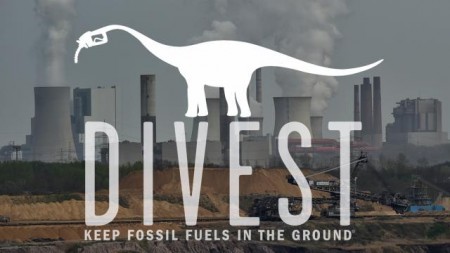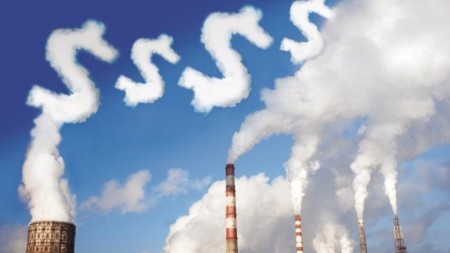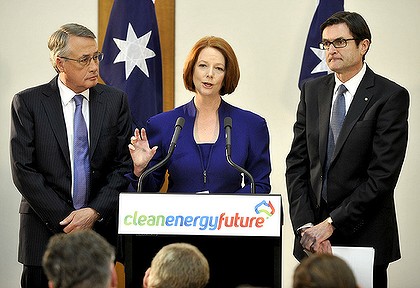Global fossil fuel divestment a tsunami of change

By Dr Anthony Horton
According to a report published by Arabella Advisors, since Climate Week in September last year more than 250 institutions and 1300 individuals have joined the global fossil fuel divestment and clean energy investment movement. The scale of the increase in divestment over the last 13 months is indeed significant-growing from $50 billion to $2.6 trillion (eg. a 50 fold increase).
There has also been a significant broadening of sectors pledging to divest. Last year, foundations, universities, faith-based organisations and NGOs were leading the movement. Now, large pension funds and private sector companies hold more than 90% of the combined assets of those who have committed to divest.
The massive growth in divestment is in part being driven by an awareness that climate change poses a risk to investment portfolios. Citigroup, HSBC, Mercer, the International Energy Agency, Bank of England and Carbon Tracker Initiative have reported evidence of a significant (and now quantifiable) risk to portfolios that include fossil fuels when the world is increasingly constrained by carbon.
Historically, the United States was the focus of the divestment movement, however divestment now covers virtually the whole world. Last year, nearly 80% of organisations that divested were based in the United States. Currently, just under 60% of organisations that divest are based there. Significantly, divesting organisations now represent nearly 650 million people around the world.
Last year, global investment in clean energy reached $310 billion, and many organisations are also committing to invest in solutions to climate change. Approximately $785 billion in assets are now held by organisations and individuals that have pledge to divest from fossil fuels and invest in clean energy.
Faith communities are also making a very strong case for the moral responsibility of acting on climate change and providing access to clean energy for the world’s poor. Faith leaders are demanding meaningful climate change actions and they are also divesting their own assets. To date nearly 130 faith based organisations with $24 billion in assets have committed to divest.
Commitments from universities have almost tripled since last year, with 40 institutions and $130 billion in assets pledging to divest. Prominent universities including Georgetown, Oxford and the University of California have committed in the last year, with the latter committing its entire $98 billion portfolio.
The California General Assembly recently voted to divest its public employee pension funds (worth $476 billion) from companies that get more than 50% of their revenue from coal mining. Providence Rhode Island, the City of Newcastle (Australia) and the Government of the ACT are notable examples.
More than 110 Foundations with over $10 billion in assets have also committed to divest from fossil fuels since September 2014.
Divestment is one mechanism in an organisation’s corporate social responsibility (CSR) tool kit; as significant as the movement is, it is important to remember that there are a number of other strategies available from a CSR perspective including carbon pricing and emission reduction targets. Carbon pricing is a very well-known strategy which has revolutionised business operations and procurement in a number of countries and industries.
Evidence is growing that carbon pricing in some shape or form is one basis upon which decisions are being made as to the procurement of goods and services. Those corporations that provide goods and services and have implemented internal carbon pricing have an advantage over their competitors, and being a market based instrument, that advantage may grow more significant over time.
Emission reduction targets-based on what science currently tells us-are another mechanism available to corporations for inclusion in their CSR tool kit. Analysis by the We Mean Business (WMB) Coalition shows that there are a range of ways a science based reduction target can be determined.
The first method is entitled the 3% solution-based on the United States’ corporate sector’s need to reduce emissions by 3% on average each year from 2010 to 2020 in order to avoid catastrophic climate change. Businesses that act now can save $US 190 billion in 2020. If they wait until 2020 to start, corporations will have to cut emissions by 10% per year to maintain the correct trajectory for 2050.
The second method-entitled Cutting absolute emissions-involves corporations reducing emissions in line with IPCC recommendations (a reduction of 41-72% by 2050 of 2010 levels). This method isn’t sector or region specific, and importantly a 41-72% reduction effectively means there is still a 1 in 3 chance global warming won’t be kept under 2°C.
Value added approaches link a corporation’s carbon emissions to their contribution to Gross Domestic Product (GDP). As a corporation’s contribution to GDP increase, the emission reductions need to keep pace. These approaches can be implemented in developed and developing countries, are flexible and reasonably simple to implement. However, they don’t necessarily account for differences in sectors.
Lastly, the Sectoral Decarbonisation Approach (SDA) allocates a carbon budget to each sector that is linked to the IPCC recommendations. Corporations in each sector can base targets on their contribution to their sector’s total activity and on their emissions intensity relative to their sector’s overall emissions intensity. It is a new method, however it should give a more accurate picture of the extent to which corporations need to maintain the 2°C ceiling. Being sector based, it also makes more sense for business.
Whichever method corporations choose to set emission reduction targets once they have considered their individual circumstances, the important point is that they are setting them in the first place. Along with divestment in fossil fuels and investment in clean energy, these mechanisms illustrate that corporations understand the challenges and opportunities that climate change presents. It is also somewhat illustrative of the need for Government to establish the policy framework and then get out of the way and let corporations do what they do best.
This article was originally published on The Climate Change Guy.
 About the author: Anthony Horton holds a PhD in Environmental Science, a Bachelor of Environmental Science with Honours and a Diploma of Carbon Management. He has a track record of delivering customised solutions in Academia, Government, the Mining Industry and Consulting based on the latest wisdom and his scientific background and experience in Climate/Atmospheric Science and Air Quality. Anthony’s work has been published in internationally recognised scientific journals and presented at international and national conferences, and he is currently on the Editorial Board of the Journal Nature Environment and Pollution Technology. Anthony also blogs on his own site, The Climate Change Guy.
About the author: Anthony Horton holds a PhD in Environmental Science, a Bachelor of Environmental Science with Honours and a Diploma of Carbon Management. He has a track record of delivering customised solutions in Academia, Government, the Mining Industry and Consulting based on the latest wisdom and his scientific background and experience in Climate/Atmospheric Science and Air Quality. Anthony’s work has been published in internationally recognised scientific journals and presented at international and national conferences, and he is currently on the Editorial Board of the Journal Nature Environment and Pollution Technology. Anthony also blogs on his own site, The Climate Change Guy.















